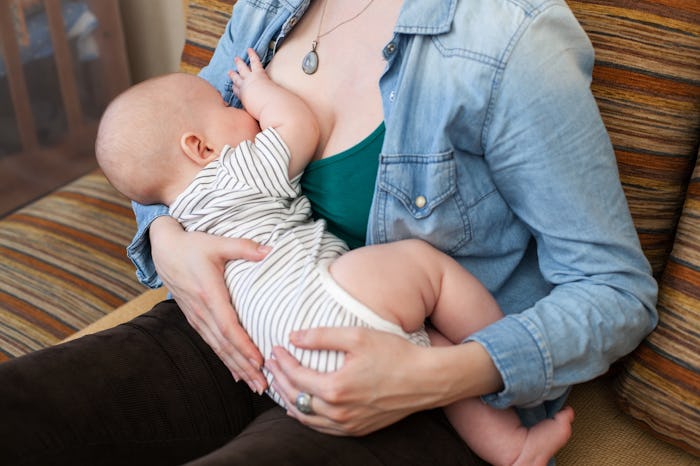Whether this is your first time as a parent or it's not your first time at the rodeo, it can still be difficult to accurately judge things when you have a non-verbal infant. If I had a dollar for every time I've wished to know what my newborn was thinking, I'm pretty sure I'd be on the cover of Forbes by now. Arguably one of the trickiest aspects of parenthood is being able to properly read the signs your baby is getting the perfect amount of milk. Since no one has invented a mind-reading device (yet...), it's always nice to have a few reliable indicators on hand when it comes to monitoring your little one's nutrition levels.
You might already know that, from one to six months of age, a baby should be receiving three to four ounces per feeding with 25 to 35 ounces over the course of 24 hours, as KellyMom reported. But how can you tell if they're really full? Luckily, pediatricians, lactation consultants, and health experts have plenty of easy ways to determine whether or not your baby is getting enough milk, for both formula and breastfed babies alike.
Check out these signs that your baby is getting the perfect amount of milk and is on the right track.
1Your Newborn Is Making Mad Gains
The number on the scale may not mean much at your average doctor's visit. But, as International Board Certified Lactation Consultant (IBCLC) Kelly Bonyata noted on Kelly Mom, "a five to seven percent weight loss during the first three to four days after birth is normal [and] baby should regain birth weight by 10 to 14 days." If your baby is meeting these weight goals, then you know that you're supplying them with the right amount of milk.
2They Have Numerous Nappies
"You can tell a baby is getting enough milk by checking their diapers," Leigh Anne O'Connor, an IBCLC, says to Romper in a recent interview via email. "Babies should have four to seven clear urine diapers [and] three to five bowel movement diapers per day." Conversely, if your baby has plenty of pee diapers, but they're dark yellow, or they're not wetting their diaper often enough, then you'll know to ask their pediatrician about nutritional needs. Additionally, O'Connor explains to Romper, "the baby's stools should be mustard yellow and a good volume — at least the size of baby's fist." So there you have it. Your complete guide to decoding diapers to determine if they're getting the right amount of milk.
3They're Thorough
As it turns out, your baby is doing a fair share of the work when breastfeeding. Obviously, you're the giver of life, but how often and completely they feed matters, too. "A telltale sign your baby is feeding properly is if your baby is feeding regularly, six to eight times a day," Caleb Backe, a Health and Wellness Expert for Maple Holistics, tells Romper in an interview via email. Another way to know if they're getting enough is by checking yourself out afterwards. One indication is if, "your breasts are noticeably less full and less achy after feeding," Backe says. Basically, this implies your baby definitely got their fill.
4They're Passed Out
Is your baby super sleepy or is the milk to blame? "My favorite sign that a new baby is getting enough milk is the 'floppy arm sign,'" Dr. Steve Silvestro, a pediatrician and host of The Child Repair Guide Podcast, tells Romper in an email interview. "If baby's arm is floppy, it means they're completely passed out and likely full." There's truly nothing quite as precious as the sight of your baby, content and full, after a feeding.
5They Burp
"Spit-ups and burps are classic signs of being full," Backe says. It may be kind of gross, but these are some of the few ways your infant is able to non-verbally communicate that they have gotten the perfect amount of milk. Of course, if their gassiness or reflux symptoms seems excessive, you can always check with a physician to rule out any serious tummy troubles.
Check out Romper's new video series, Bearing The Motherload, where disagreeing parents from different sides of an issue sit down with a mediator and talk about how to support (and not judge) each other’s parenting perspectives. New episodes air Mondays on Facebook.
